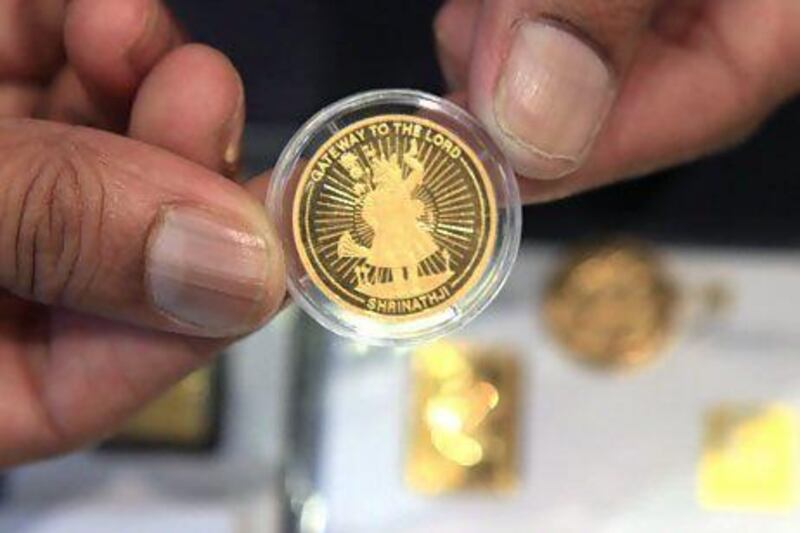Sales of gold coins have proved to be a bright spot in India this year.
"Indians are buying more gold coins due to a shift in demand from jewellery to investment," says Madhavi Mehta, an analyst at Kotak Commodities.
The coin-shaped pieces of gold, sold at banks and jewellers and often embossed with designs such as the Hindu goddess of wealth, Lakshmi, have become increasingly popular as Indians look for a haven for their cash. At the same time, many shops report that this year they have seen demand weaken for gold jewellery, a less pure form of the precious metal that carries a high markup for its design and manufacturing.
Gold prices have hit record highs in India in recent months because the rupee has weakened against the US dollar, which pushes prices up in local currency terms. Consumer sentiment has also weakened amid slowing economic growth and high inflation.
India was the world's largest consumer of gold last year, but it is expected to be overtaken by China this year.
Still, data from the World Gold Council show that demand for gold coins surged by 59 per cent in the third quarter compared to the same period last year.
"As per World Gold Council data, Indian jewellery demand stood at 136.1 tonnes, while bar and coin demand stood at 87 tonnes," says Ms Mehta. "This indicates a ratio of 61:39 for gold demand. As against the third quarter of 2009, the ratio was 81:19 as jewellery demand stood at 111.6 tonnes while net retail investment was at 26 tonnes."
Gold coins, though, are not always bought for investment purposes.
"If you want to buy gold, the minimum amount in jewellery is more than what you would end up buying in coins," says Bhargava Vaidya at BN Vaidya & Associates. "If you just want to buy something you can go in and buy a gold coin."
Coins are often bought with the aim of eventually converting them into jewellery, which is an attractive hedging option if the buyer believes that prices will continue to rise, Mr Vaidya says. "Sometimes a person may be collecting a coin for him or her to change into jewellery when their son or daughter gets married."
Dimpesh Jain, the manager of Motaba & Sons, a jewellery store in Mumbai, says that demand for gold coins has increased by 30 per cent this year, while jewellery sales have fallen by the same amount.
"People have become more aware of the coins," he explains. "They prefer investing in gold coins now rather than jewellery.
But this is not necessarily good for business.
"We get a much higher profit on jewellery because of the profits on the labour. The amount of markup on coins in a very small percentage."
Across the road, Rajendra Gurjar, the owner of Gurjar Gold and Diamond jewellers, says that gold coins are "easier to sell" and represent "better value as an investment" than jewellery.
"People think that prices are going to continue to rise, and with jewellery they don't get the full value of the gold," says Rohit Jain, the co-owner of Surana Gold, another jewellery shop. "It's cheaper for the customer - you don't have to pay the making charge."
Gold plays an important role in Indian culture and gift-giving, particularly during religious festivals and weddings.
"Indians think of gold not only as an investment," says Mr Jain at Motaba & Sons. "It's a passion, a tradition."
But there are divided views on whether that love of gold is actually good for the economy. The nation's central bank has been trying to curb speculation and control imports of the precious metal.
"The Indian government has taken a number of steps this year to reduce gold purchases. The hike in import duty, tightening of norms for gold loan companies and discouraging investment in gold is part of government efforts to curb demand for the metal," says Ms Mehta. "While [the central bank] and government pressure will dent sentiments, a sharp drop in investment demand is unlikely due to the lack of other viable investments."
Sujan Hajra, the chief economist at Anand Rathi, a financial services company based in Mumbai, says: "Some think that gold is an unproductive asset and gold is something which is stopping India from improving the investment because there is a shift from financial assets. Also some people think that gold is one reason why India is having such a big current account deficit."
But Indians place great value on the precious metal in their finances.
"Gold is a very simple asset," Mr Hajra says. "For the poor, if they want to borrow, gold is the easiest collateral for them to borrow."
Meanwhile, the custom of giving gold during weddings in India is more than just a social tradition.
"In India you don't have a formal social security, so if there is some eventuality for the woman and Indian law clearly provides protection so that gold belongs to the woman," Mr Hajra says. "Gold is a social security system also in India. There are clear divides over whether gold is good or bad for India."





